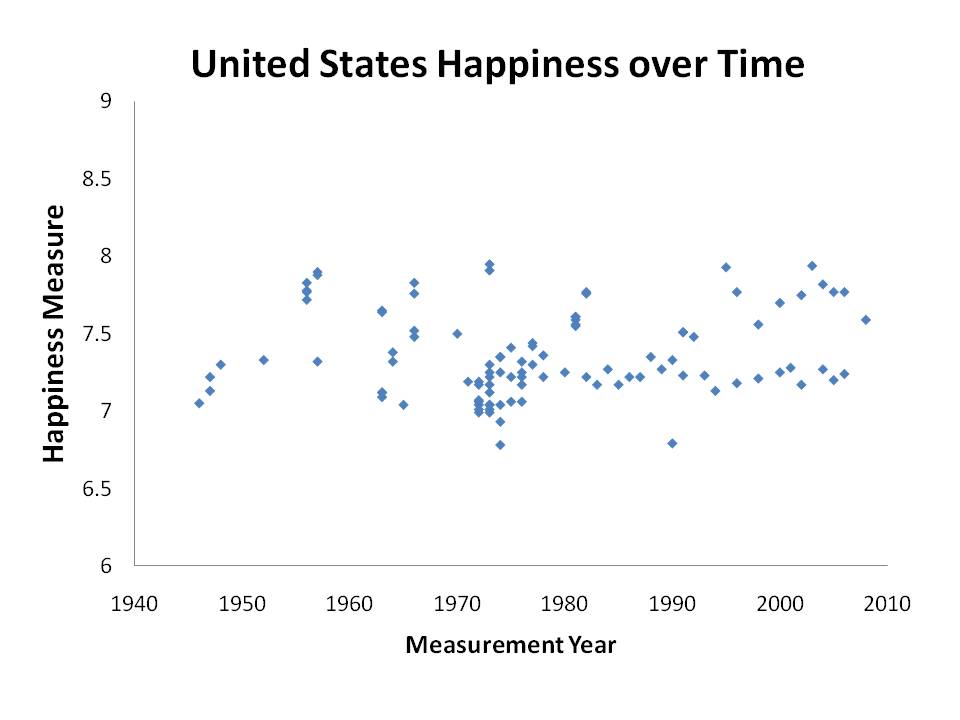Two generation�s ago, my grandparen�ts were able to own a house, a decent car and send four children to college. They accomplished this on ONE post office worker's salary and small odd jobs by being very financiall�y conservati�ve (no restaurant�s, expensive clothes or major vacations) while saving for 15 years before buying their house�. Today I know a two-salary highly-compensate�d power couple who own a small apartment near where my grandparents used to live. This couple eats at nice restaurants, vacations abroad and dresses impeccably. They actively debate whether they should have a second child because they're afraid that they can't offer that child what they consider to be a high quality of life.
So whose life is better? It's tempting to adjust the income and net assets from my grandparents time to today's dollar. This comparison would likely conclude that today's power couple is better off. Of course, this is overly simplistic - using the standard of living to compare whose life is better between different generations may be objective but only the "he who dies with the most toys wins" crowd would take that suggestion very seriously. This same overly simplistic argument occurs when we measure economic size using GDP. Economists haven't advanced much beyond the Robert Kennedy's criticism that, "...the gross national product does not allow for the health of our children, the quality of their education, or the joy of their play. It does not include the beauty of our poetry or the strength of our marriages; the intelligence of our public debate or the integrity of our public officials. It measures neither our wit nor our courage; neither our wisdom nor our learning; neither our compassion nor our devotion to our country; it measures everything, in short, except that which makes life worthwhile. And it tells us everything about America except why we are proud that we are Americans."
To replace the GDP, many have proposed alternatives like the the Gross National Happiness (which includes sustainable development, cultural values, environmental conservation and governance) or Genuine Progress Indicator (which accounts for the costs of crime, resource depletion). Neither of these broader, more holistic measures has made its way into mainstream economics analysis or business reporting as we are still inundated with GDP reports and the narrow set of information it provides.
Quality of life metrics exist that include not only standards of living, but also factors like environment, physical health, mental health, education, leisure time and recreation. Unfortunately, these measurements make arbitrary choices about what components contribute to a high or low quality of life.
A much simpler approach is to just ask the question, who is happier? Researchers have been measuring Happiness in different countries for decades. While this measurement is less objective than a purely objective measure like height or weight, there is still some validity in its use.
When we look at American Happiness over time, we don't observe any major trends over the last 60 years. Some researchers embrace this Happiness data and comment that the changes in GDP per capita, technological advances and life expectancies have all failed to have a significant impact on American Happiness. My take is that Happiness is a noisy measurement with ceiling effects and while there are probably segments of the American population who have seen their Happiness improve, most are probably about as happy as they were decades ago.
What about the comparison of my grandparents versus my power couple friends? In trying to compare lives of these different time periods, we need to recall that not only has the purchasing power, level of income inequality and average education levels changed over the decades, but more broadly, for much of society, there have been shifts in desired family size, career aspirations and gender roles. The Great Depression shaped much of my grandparent's perspective on the world just as those who are currently long-term unemployed will never forget the helpless feeling of not being able to find work.
While many things have changed over the last couple of generations, human nature has stayed constant including the desire that people have for self-worth, love, happiness and freedom. Both my grandparents many decades ago and my power couple friends today found happiness, though they had very different life goals and they pursued their happiness in very different ways.

Notes: The data source was the World Database of Happiness 3-step Verbal Happiness measurement. Using this input data, time is not a statistically significant predictor of happiness (p>>0.05). Ceiling effects occur in many areas of survey statistics where respondents may avoid answering at the highest level of a scale. Bhutan is a rare example of a country that has embraced the idea of Gross National Happiness, a phrase coined by their King in 1972
Please join Howard's Facebook Fan page
�
Follow Howard Steven Friedman on Twitter: www.twitter.com/howardsfriedman
Sara Spraker Joanne Montanez Minka Kelly Jessica Biel Shana Hiatt
No comments:
Post a Comment